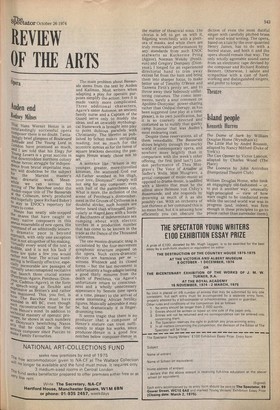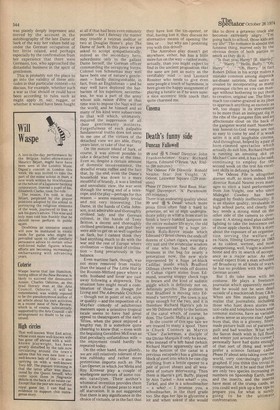Theatre
Island people
Kenneth Hurren
The Dame of Sark by William Douglas Home (Wyndham's) The Little Hut by Andre Roussin, adapted by Nancy Mitford (Duke of York's) The Can Opener by Victor Lanoux, adapted by Charles Wood (The Place) The Looneys by John Antrobus (Hampstead Theatre Club) William Douglas Home, who took an engagingly old-fashioned – or, to put it another way, unusually high-principled — view of how wars ought to be conducted even while the second world war was in progress (and, indeed, was firm enough in these principles to go to prison rather than surrender them), was plainly deeply impressed and moved by the account in the autobiography of the late Dame of Sark of the way her values held up under the German occupation of her little island, and perhaps especially by the confirmation from her experience that there were Germans, too, who approached the distasteful business in the spirit of gentlemen.
This is probably not the place to go into the validity of these attitudes in that particular context—to discuss, for example, whether such a war as that should or could have been according to rules such as might apply in, say, rugger, or whether it would have been fought
at all if that had been even remotely possible — but I daresay the matter may trouble a veteran auditor or two at Douglas Home's play The Dame of Sark. In this piece we are asked to accept sympathetically, indeed as the secondary hero, subordinate only to the gallant Dame herself, the German officer commanding the occupying forces. Colonel von Schmettau may well have been one of nature's gentlemen — hardly distinguishable, in fact, from an Englishman — and he may well have deplored the barbarism of his superiors; nevertheless, he was a part of the army whose sole. raison dVtre at that time was to impose the Nazi will on the world, and he himself and so many of his kind were subservient to that will which, ultimately, required the suppression of all their gentlemanly instincts. Forgetfulness of such palpable fundamental truths does not seem to me one of the virtues of the detached view we are able, thirty years later, to take of that war.
On the minute island of Sark, of course, it was almost possible to take a detached view at the time. Even so, despite a certain amount of domestic inconvenience, the dreadful ersatz coffee and the fact that, by the end, even the Dame's household was down to a mere mouthful of brandy, it was a limited and unrealistic view, the war seen through the wrong end of a telescope, and the play—perhaps for this reason — seems essentially trivial and not very interesting. The Dame, in the hands of Celia Johnson, is an admirable and thoroughly civilised lady, and the German colonel, in the hands of Tony Britton, a decent and thoroughly civilised gentleman. I am glad they were able to get on so well together on Sark, but I cannot think they had anything much to do with the war and the rest of Europe where civilisation — their kind of civilisation — hung precariously in the balance.
Even wartime Sark, though, was not more removed from reality than the island of The Little Hut in the Roussin-Mitford piece where a wife, husband and lover are cast away following a shipwreck. The situation here might recall a combination of those in Design for Living and The Admirable Crichton — though not in point of wit, style or quality — and the imposition of a Mayfair comedy of adulterous manners upon a primitive tropical locale seems to have had great appeal to theatregoers of the early 'fifties, when the piece enjoyed a lengthy run. It is somehow quite cheering to know that — even with the beguiling Geraldine McEwan as that peculiarly unfastidious wife — the enjoyment could hardly be repeated today.
On the other hand, more glumly, we are still relatively tolerant of no less rubbishy and rather more
pretentious imports such as The Can Opener, in which Joe Melia and Roy Kinnear play a couple of
woebegone survivors of some cos mic cataclysm. Their author's whimsical invention provides them with a stack of tinned peas to ward off starvation. It is not suggested that there is any significance in the choice of victuals, or in the fact that they have lost the tin-opener, or that, having lost it, they discuss no alternative means of opening the tins, or . . . but why am I pestering you with this drivel? The Antrobus play doesn't get anywhere, either, but has a little more fun on the way — rather more, actually, than you might expect to find in the ancient proposition that the sane are just as nutty as the certifiably mad — and Leonard Rossiter who tends to give even sane people a touch of barminess, is here given the happy assignment of playing a lunatic as if he were sane: a nice eccentric little touch that, quite charmed me.











































 Previous page
Previous page